TheCable Q&A: I’d rather subsidise crude sale to refineries than petrol, says Anyim
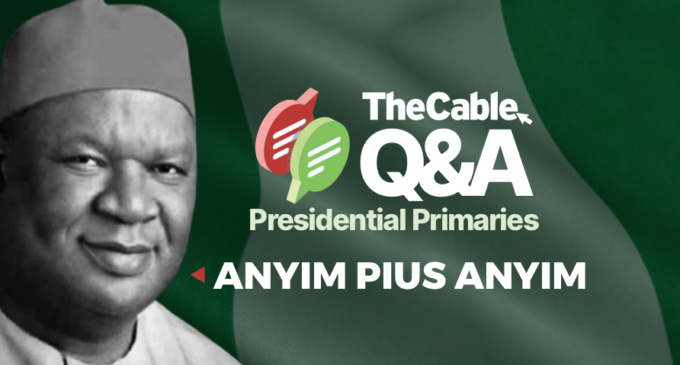
As Nigeria’s two biggest parties hold special conventions to pick their presidential flag bearer this weekend, TheCable poses the same questions to a number of contenders on their agenda for Nigeria. Anyim Pius Anyim, former senate president, former secretary to the government of the federation and PDP presidential hopeful, takes his turn…
One of the biggest issues in Nigeria today is insecurity. How would you tackle the multifarious menace of insurgency, banditry, terrorism and kidnapping?
I think you need to add separatist agitations, militancy and cultism to your list. As a starting point, it is important to properly profile the various manifestations of insecurity in Nigeria in terms of their origin, the parts of the country they are prevalent and the underlining factors driving each kind of insecurity. If you look closely at the different manifestations of insecurity you mentioned above, you will find out that each of then is driven by different forces or factors, for instance insurgency, militancy, and separatist agitations are politically driven. Banditry, kidnaping and internet fraud essentially have economic factors behind them while cultism is easily a product of social disorientation. Criminality has however become a common denominator among all of them. Therefore, in tackling insecurity I will isolate those driven by political considerations and seek appropriate political solutions by bringing relevant stakeholders together to reach consensus on the fundamental issues.
On those motivated by economic considerations, we must note that our economy in the last six years has shrunk abysmally while our population has continued to grow exponentially, leading to a spike in unemployment and general lack of economic opportunities. The solution, therefore, is to initiate policies that will stimulate growth and expansion in the economy for example policies that will stimulate foreign direct investment, private sector participation and expansion of productive activities through small, medium and large-scale industrialisation. That way, we will be able to productively engage most of the youth that are now available for all manner of criminal activities.
On those motivated by social factors, we will overhaul our educational sector to restore order and discipline and promote effective learning. Most importantly, we will also restore the educational system and structure that do not just encourage all to head straight to the university after secondary school. In other words, technical education and skills acquisition will be made critical components of our educational system.
Finally, common criminals will be dealt with decisively according to the law.
The economy is in a terrible situation with debts pilling up, oil revenue dropping and prices of goods and services hitting the roof. What measures would you take to redress the crises?
Again, let me add that petroleum subsidy and the continuous depreciation of the naira are also time bombs waiting to explode. I must say that the situation, though worse now, was nearly as bad when President (Olusegun) Obasanjo took over the mantle of leadership in 1999. However, Obasanjo provided the needed leadership and regained the confidence of the international community to the effect that our debts were largely forgiven, foreign investors trooped into the economy and the situation reversed.
In addressing our economic woes, I shall, first and foremost, regain the confidence of the international community with a transparent, competent and patriotic leadership of the country. We shall initiate policies that will attract foreign investments into the economy, encourage local production and discourage importation to stabilise the naira. We shall refocus the economy on the new world economy direction based on knowledge, talent and innovation. By this, unemployment crises will be arrested and the social environment will be sanitised. With a stable political, economic, and social environment, we shall seek and secure the cooperation of our debtors to reschedule, renegotiate or even ask for cancellation of our debts.
Youth unemployment is one of the biggest challenges facing Nigeria today. What plans do you have to address the situation?
I have always maintained that next to our diversity, our youth are our most misused and underutilised asset. Nigeria has a youth population (15-35 years) of about 77,347,611 or 36.68 per cent of Nigeria’s population (2021 estimate). Nigeria’s current unemployment statistics is dire. According to the National Bureau of Statistics, as of 2020, youth unemployment, which represents the cohort from 15-34 years old, is 35 per cent. Only 37 per cent are fully employed (40 hours or more per week), with 28 per cent underemployed (20-39 hours a week). Cumulatively, about 25 million Nigerian graduates are unemployed. While it is true that our unemployment situation is dire, permit to say that underemployment is more dangerous as it fuels corruption. This is why the social programmes of the government have created more criminals than addressing unemployment.
In planning for our youth engagement through employment we will note the following:
- That the traditional white-collar employment and other conventional job creation efforts of the government will no longer be able to provide gainful employment to the teeming youth population;
- That the private sector is going to drive the economy and so productivity, competence and skill will take pre-eminence;
- That the economy is now transiting to a knowledge, talent and innovation-based economy;
- That artificial intelligence, automation and disruptive technologies and innovations are going to displace more traditional jobs.
In view of the above, our job creation model will first restructure our educational institutions, that is, the education curricular will be refocused to emphasise training and re-training for skills, discovery of talents and promotion of innovations. We shall, accordingly, set up innovation hubs to facilitate engagement in e-commerce and information technology. We shall set up start-up corridors to encourage deployment of skills and talents and support such hubs and corridors with technology and start-up capital. Our target will be mass engagement of our young people on a competitive basis. This will enhance productivity and promote dignity of labour. We are confident that, with clear focus and sustained efforts, we shall overcome mass youth unemployment in record time.
Petroleum subsidy is projected to gulp N4 trillion in the 2022 fiscal year. What would be your own policy choice on pricing?
N4 trillion is about 24 per cent of Nigeria’s N17.126 trillion budget for 2022. Spending that huge amount on petroleum subsidy alone is obviously not sustainable. My approach to dealing with the petroleum subsidy will be to deregulate, completely, the downstream sector of the petroleum industry. We will open up the space for small players who can set up modular refineries to service markets in their localities. Petroleum refining technology is no longer rocket science. We will beef up government’s regulatory capacity to guarantee quality control and ensure that players in the industry comply with all regulatory requirements. If there will be any need for subsidy, it will be cheaper and more transparent to subsidise at the crude end for operators of refineries than the current subsidy at the refined product end which is riddled with corruption and inefficiency. My ultimate target is to ensure we meet our petroleum products domestic needs locally in the first 24 months of our administration and the pricing will be determined by local market forces, as local refineries compete in the market.
Despite trillions of naira spent on the power sector, we are still not out of darkness. What are we not getting right and how would you tackle the issue?
The power sector problem has become intractable like the petroleum subsidy we just talked about. I must say that we cannot get this sector right until we completely deregulate the sector. Our experiences have shown that the national grid system is riddled with corruption, weak transmission infrastructure, distribution and generation inefficiencies etc. In today’s world, there are multiple options for power generation and usage at private levels. The Lagos/Ogun industrial axis are efficient because operators generate their own electricity power using gas. Aside from gas, solar and other renewable energy solutions are options available to electricity consumers. Our government shall incentivise industrial consumers to explore other options to generate electricity for their use.
ASUU strikes have been part of the annual national calendar for decades. How would you address the perennial issues once and for all?
I have had the privilege of being part of the government team that interfaced with ASUU over the years, both as president of the senate and secretary to the government of the federation, and I can say, with due modesty, that I understand the issues involved. I must say that ASUU demand is not just about remuneration but also substantial investment into the sector. In order to determine the needed investment in the sector, we set up the tertiary institutions needs assessment committee to ascertain the level of investment required in the sector. The findings of the committee were troubling. Indeed, the funding requirement of the sector is staggering. Our government shall, as a matter of necessity, overhaul the tertiary education sector to make autonomy of the institutions a practical reality. We shall review the role and impact of Tetfund in supporting the institutions, so as to make them more effective and efficient to ensure that tertiary education is accessible, affordable and qualitative.
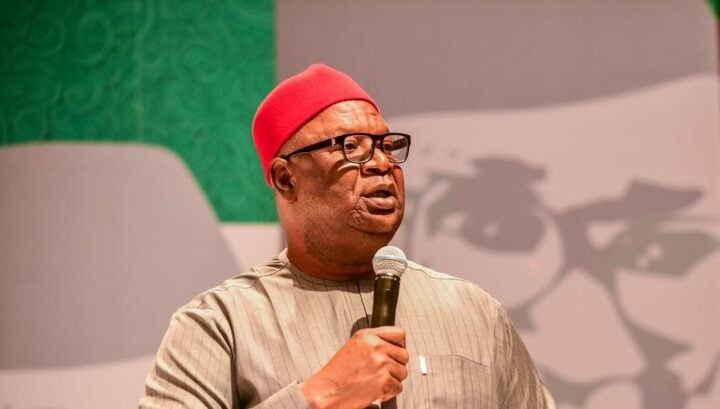
“What is fuelling agitation for Biafra is the feeling of marginalisation and exclusion by the youths of the south-east. And the simple cure is full re-integration of the south-east into the Nigerian polity by extending equal opportunities to Nigerian citizens of the south-east extraction”
Nigeria has a worrisome number of out-of-school children. What is the way out?
The problem of out-of-school children has been compounded lately by insecurity and kidnapping of school children, particularly in the north. General economic downturn has severely eroded the capacity of most parents to keep their children in school, even when primary and secondary schools are tuition free in public schools in most states. To address the out-of-school children problem squarely, a combination of strategies will need to be adopted. First the issue of insecurity will have to be decisively dealt with as I have outlined above. Secondly, we will repackage the Almajiri school programme in the north and out-of-school programme in the south. We will structure the school system in such a way that at primary level it will be compulsory and free and at secondary level, technical and skills acquisition programmes will be free.
Waste and corruption remain endemic in Nigeria. What would be your own strategy to tackle them?
To effectively tackle corruption, particularly in the public sector, we must first and foremost, remove the enablers of corruption. In the first place, appointment into the public service, without prejudice to the federal character principle, shall be based on competence and capacity and not patronage. It has been established that competent people strive for honour, excellence and integrity. We will flush out of the system, every sense of patronage which is a major incubator of corruption. As president, I will be accountable, transparent, responsive and abide by the rule of law to set a personal example. We shall, by deliberate policy, minimise government participation in economic activities as we will promote market driven solutions that will empower the private sector as the key driver of the economy.
We shall also promote transparency through the use of technology in executing government business. Above all, every incidence of corruption will be squarely dealt with. On cutting out waste, we will run a government that will insist on resource efficiency. Every naira spent will be justified. We will redefine governance in a way that prioritises hard work, value creation and patriotism.
Public healthcare in Nigeria is in a shambles and only the elite can afford good healthcare. What would you do differently to change the story?
Nigeria has some of the worst healthcare indicators in Africa and the fourth worst in the world. With our population growing at 3.2 per cent annually, one of the fastest growing populations globally, healthcare is a big issue in Nigeria. However, and rather paradoxically, Nigeria contributes some of the highest healthcare human resources (doctors and nurses) to the world. Healthcare provision is capital intensive. Funding has remained a huge challenge to quality healthcare in Nigeria. What I will do differently to change the story will include: one, fixing healthcare financing to fix our health system. This I will do by working with the private sector and our development partners to address all the issues holding back the full rollout of health insurance across the country. My government will work with the state governments to democratize access to health insurance, especially in the informal sector. We will specifically provide incentives to encourage private sector investments across the health value chain. Two, we will work assiduously to restart our economy and make it thrive such that we will have the capacity to adequately remunerate our healthcare professionals and have the courage and confidence to invite our professionals, who have been driven abroad in search of better working conditions, to return home in a “reverse brain drain” initiative. We will incentivise the creation of centres of excellence in primary, secondary and tertiary health institutions across the six geo-political zones of Nigeria.
What would you do in practical terms to address the agitation for Biafra.
Agitation for Biafra is not an isolated case. It is one of the manifestations of insecurity we are currently facing in Nigeria. I have said it many times that what is fuelling agitation for Biafra is the feeling of marginalisation and exclusion by the youths of the south-east. And the simple cure is full re-integration of the south-east into the Nigerian polity by extending equal opportunities to Nigerian citizens of the south-east extraction. Electing a south-easterner as president of Nigeria in 2023 will be an effective cure for agitation for Biafra. When, by the grace of God and the will of all Nigerians, I am elected president of Nigeria in 2023, I work with all Nigerians to give comfort to and address the fears, worries and expectations of all Nigerians from every part of this country, so that together we will rededicate ourselves to building a nation we all shall be proud of.
Sections of the country are campaigning for restructuring, particularly in the sharing of oil revenue and the political set-up of the country. How would you handle these agitations?
In a multi-ethnic country like Nigeria, agitations for one thing or another are bound to occur from time to time. That has been the experience right from the formation of our union from the colonial period till date. So, every part of this country needs to be given comfort and a sense of belonging at every point in time. Restructuring means different things to different people, depending on what their peculiar issues are per time. What I will do as president, will be to create a platform for Nigerians to express themselves, their concerns, expectations, worries, doubts, fears, etc, in an atmosphere that is conducive. We will harvest such views, opinions, suggestions and whatever and build consensus on what will work for our country. We will give every part of this country comfort as an equal stakeholder in the Nigerian project. That way, we will engender a renewed spirit of patriotism to build the Nigeria of our collective dreams.
What is your BIG IDEA for a new Nigeria.
My big idea for a new Nigeria is to re-invent Nigeria by unlocking and unleashing the abundant talents, energy and creativity of our huge youth population for our national rebirth and transformation. I want to prepare Nigeria for the 4th industrial revolution in our fast-changing world from the second quarter of the 21st century. The next administration that will take over the leadership of Nigeria from 2023 must be futuristic in thinking, planning, policy and Programmes conceptualisation and implementation. I am offering to lead the charge to re-direct Nigeria on the path of the new world political, economic and social direction. The ultimate goal is to secure the lives of Nigerians, rebuild our country, re-unite our people, deliver prosperity to our citizens and secure a space on the table for Nigeria on the global stage.






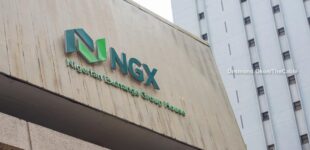
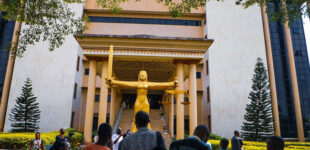

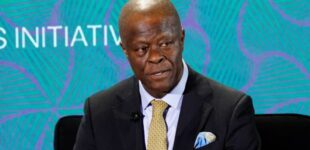

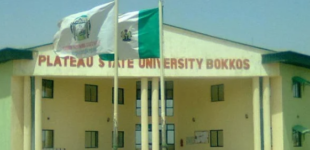



There are no comments at the moment, do you want to add one?
Write a comment